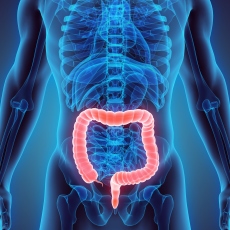Leading the way in Hartford
Connecticut Gastroenterology Associates, P.C.IBD - Inflammatory Bowel Disease Inflammatory bowel disease (which is not the same thing as irritable bowel syndrome, or IBS) refers to two chronic diseases that cause inflammation of the intestines: ulcerative colitis and Crohn's disease. Although the diseases have some features in common, there are some important differences. 
Ulcerative colitis is an inflammatory disease of the large intestine, also called the colon. In ulcerative colitis, the inner lining - or mucosa - of the intestine becomes inflamed (meaning the lining of the intestinal wall reddens and swells) and develops ulcers (an ulcer is a sore, which means it's an open, painful wound). Ulcerative colitis is often the most severe in the rectal area, which can cause frequent diarrhea. Mucus and blood often appear in the stool (feces or poop) if the lining of the colon is damaged. Crohn's disease differs from ulcerative colitis in the areas of the bowel it involves - it most commonly affects the last part of the small intestine (called the terminal ileum) and parts of the large intestine. However, Crohn's disease isn't limited to these areas and can attack any part of the digestive tract. Crohn's disease causes inflammation that extends much deeper into the layers of the intestinal wall than ulcerative colitis does. Crohn's disease generally tends to involve the entire bowel wall, whereas ulcerative colitis affects only the lining of the bowel. External resourcesRead more
| Leading the way
in Hartford
Connecticut Gastroenterology Associates, P.C.IBD - Inflammatory
Bowel Disease Inflammatory bowel disease (which is not the same thing as irritable bowel syndrome, or IBS) refers to two chronic diseases that cause inflammation of the intestines: ulcerative colitis and Crohn's disease. Although the diseases have some features in common, there are some important differences. 
Ulcerative colitis is an inflammatory disease of the large intestine, also called the colon. In ulcerative colitis, the inner lining - or mucosa - of the intestine becomes inflamed (meaning the lining of the intestinal wall reddens and swells) and develops ulcers (an ulcer is a sore, which means it's an open, painful wound). Ulcerative colitis is often the most severe in the rectal area, which can cause frequent diarrhea. Mucus and blood often appear in the stool (feces or poop) if the lining of the colon is damaged. Crohn's disease differs from ulcerative colitis in the areas of the bowel it involves - it most commonly affects the last part of the small intestine (called the terminal ileum) and parts of the large intestine. However, Crohn's disease isn't limited to these areas and can attack any part of the digestive tract. Crohn's disease causes inflammation that extends much deeper into the layers of the intestinal wall than ulcerative colitis does. Crohn's disease generally tends to involve the entire bowel wall, whereas ulcerative colitis affects only the lining of the bowel. External resourcesRead more
| Leading the way in Hartford
Connecticut Gastroenterology Associates, P.C.IBD - Inflammatory Bowel Disease Inflammatory bowel disease (which is not the same thing as irritable bowel syndrome, or IBS) refers to two chronic diseases that cause inflammation of the intestines: ulcerative colitis and Crohn's disease. Although the diseases have some features in common, there are some important differences. 
Ulcerative colitis is an inflammatory disease of the large intestine, also called the colon. In ulcerative colitis, the inner lining - or mucosa - of the intestine becomes inflamed (meaning the lining of the intestinal wall reddens and swells) and develops ulcers (an ulcer is a sore, which means it's an open, painful wound). Ulcerative colitis is often the most severe in the rectal area, which can cause frequent diarrhea. Mucus and blood often appear in the stool (feces or poop) if the lining of the colon is damaged. Crohn's disease differs from ulcerative colitis in the areas of the bowel it involves - it most commonly affects the last part of the small intestine (called the terminal ileum) and parts of the large intestine. However, Crohn's disease isn't limited to these areas and can attack any part of the digestive tract. Crohn's disease causes inflammation that extends much deeper into the layers of the intestinal wall than ulcerative colitis does. Crohn's disease generally tends to involve the entire bowel wall, whereas ulcerative colitis affects only the lining of the bowel. External resourcesRead more
|
|
|





